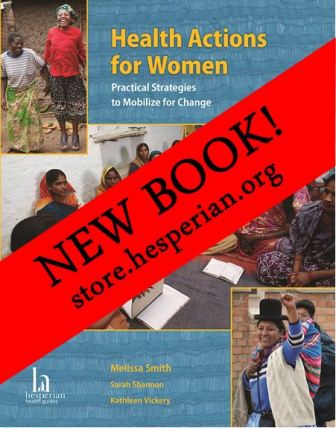New Hesperian Book Focuses on Improving Health Through Community Organizing
In the early 1970s, Hesperian Health Guides developed “Where There Is No Doctor,” a health care manual used by health workers and others involved in delivering primary care and promoting health programs. Hesperian now offers a dozen books and health materials in more than 80 languages. Its latest resource, “Health Actions for Women: Practical Strategies to Mobilize for Change,” released this month, is drawing kudos — from the likes of Cecile Richards, Judy Norsigian and Paul Farmer, among others — for its approach to helping women (and men) create change in their communities to improve the health of women and girls. Health Actions for Women: Practical Strategies to Mobilize for Change Concrete steps for community organizing and problem-solving are woven throughout the book,

In the early 1970s, Hesperian Health Guides developed “Where There Is No Doctor,” a health care manual used by health workers and others involved in delivering primary care and promoting health programs.
Hesperian now offers a dozen books and health materials in more than 80 languages. Its latest resource, “Health Actions for Women: Practical Strategies to Mobilize for Change,” released this month, is drawing kudos — from the likes of Cecile Richards, Judy Norsigian and Paul Farmer, among others — for its approach to helping women (and men) create change in their communities to improve the health of women and girls.
Concrete steps for community organizing and problem-solving are woven throughout the book, and the illustrations are engaging and informative. Health topics include sexuality and sexual health, preventing sexually transmitted infections, healthy pregnancies and safe births, and preventing women’s deaths from unsafe abortions.
“This book is critically important right now because it gives women the tools we need to stand up for our health and rights, and those of our daughters, through grassroots work and organizing,” Sarah Shannon, Hesperian executive director, told OBOS. Shannon co-authored the book with Melissa Smith and Kathleen Vickery.
“Right now, we find ourselves in a moment of global retrenchment, in the United States, Latin America, and other parts of the world,” Shannon added. “We’re living in a time in which women’s reproductive and sexual health and rights are being systematically withdrawn. ‘Health Actions’ encourages us to dive in and fight back, and provides stories and activities that show how to do it successfully.”
To celebrate the book launch, Planned Parenthood Global is hosting a release party tonight (free tickets are still available). Other events will take place in Boston, Austin, Seattle and in the San Francisco Bay Area.
Prior to publication, “Health Actions for Women” was field tested in 23 countries. More than 40 community-based partners brought together diverse groups of younger and older women, and mixed gender groups, to try out activities and submit their feedback; all total, 1,400 people took part in discussions and exercises.
Here’s how one group responded:
Both men and women enjoyed the activities. They were discussing gender for the first time. At the end of the day all the group members decided that they are going to raise the issue of equal pay for equal work; especially about agricultural labour. At present, Men get Rs. 150 & women get Rs. 70 per day. In fact, women put in more work than men. They decided that they will raise this issue with TantaMukti Committee (a village-level dispute resolution committee) and elected representatives of Gram Panchayat (the local self-governance institution) to discuss this issue at the village meeting.
– Tathapi Trust, India
And another:
The participants learned about their sexuality, how they perceive their sexuality and to recognize that pleasure is part of sexuality and sexual health. The group identified some of the cultural and social barriers that limit women’s opportunities to learn about their sexuality. There were a few times during the workshop when some of the participants expressed discomfort and embarrassment, but as the activities and discussion progressed, the participants expressed very positive feelings about what they were learning.
– GOJovenes Associate, Guatemala
“Health Actions for Women” stresses using personal stories to encourage conversations. The chapter “Preventing Deaths from Unsafe Abortion,” for example, features four sample stories about unintended pregnancy. It also includes activities for discussing facts and myths about abortion and challenging the way people might talk about women who have abortions.
Each chapter also includes stories from activists and medical professionals that outline community challenges as well as next steps for engagement and problem-solving.
Learn more about the contents of “Health Actions for Women” in this video:
The post New Hesperian Book Focuses on Improving Health Through Community Organizing appeared first on Our Bodies Ourselves.
SOURCE: Our Bodies Ourselves – Read entire story here.









